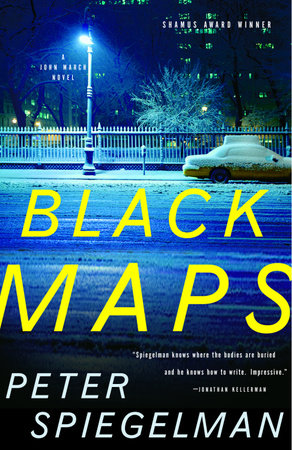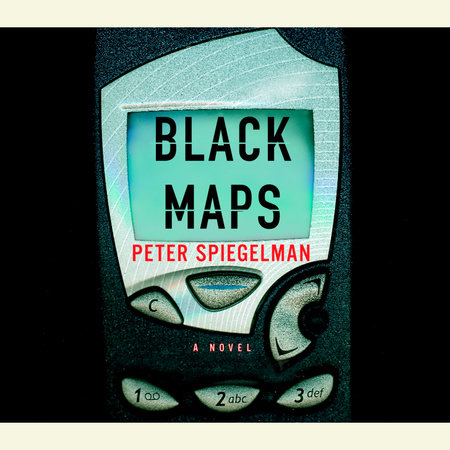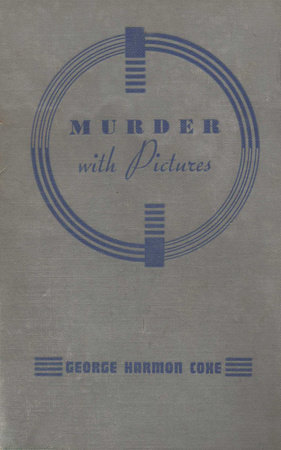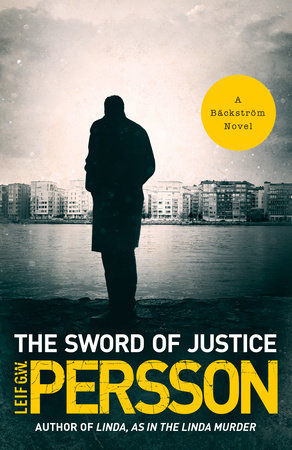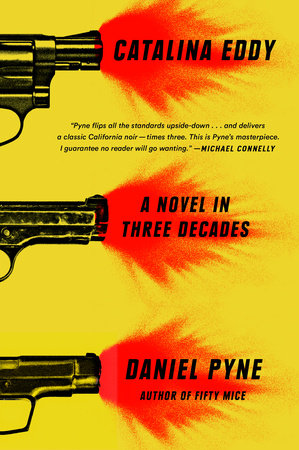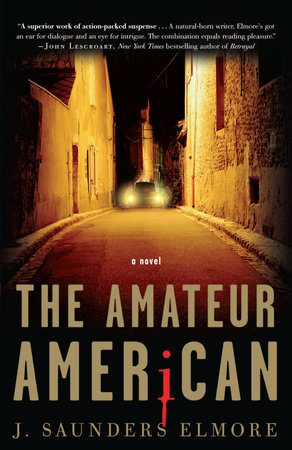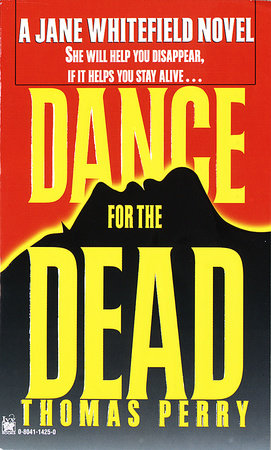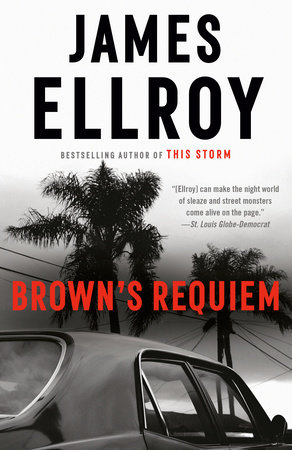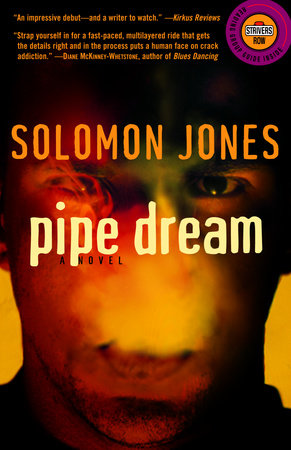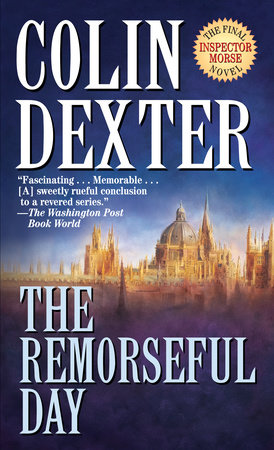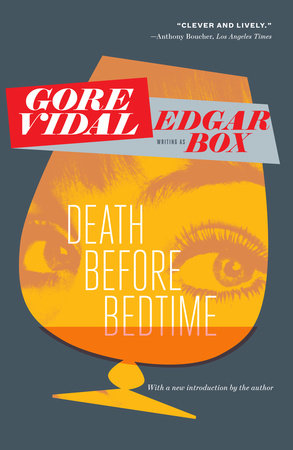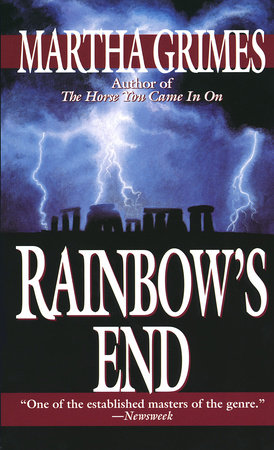A Conversation with Peter Spiegelman
Q: What prompted you to leave the financial world behind and become a writer?
A: It was the intersection of opportunity and longtime interest. Several years ago, my partners and I sold our banking software company to a much bigger firm, and signed on to manage the integration of our business into the larger operation. My contract with the company ended in 2001, and I found myself with time on my hands, and an interest in doing something different. That something was writing. I’ve always been an avid reader, and a big fan of thrillers and detective novels, and from time to time I’d thought about trying my hand at one. I’d done a lot of writing as an undergraduate — though of poetry rather than prose — and during the twenty-plus years I spent in software and banking, I’d often thought about pursuing it again. In 2001, I had both the time and the wherewithal to do it.
Q: When did you first get the idea for Black Maps and for the character of John March?
A: I got the idea for March and for Black Maps while commuting to and from the office. The character of March came first, and I suppose he arose in part from the venerable tradition of damaged heroes in detective fiction. Certainly some of my earliest thoughts about him had to do with the loss he’s suffered, and the highly disciplined, nearly ascetic life — of work and running and solitude — that he’s constructed to keep his pain at bay. I also knew that March would have an almost photographic eye for detail — that he would be a “close observer” (as Le Carre describes the hero of The Night Manager) of people and things, and that this would be part of what makes him good at his work.
As March evolved in my imagination, as his toughness and skepticism emerged, along with his edginess and loneliness, it became clear to me that he could only be a New Yorker. It also seemed natural to me to place him not precisely on Wall Street, but around it — to give him an insider’s knowledge of The Street, but without the self-infatuation of an insider. I wanted him to have some critical distance, and a healthy mistrust.
The idea for Black Maps itself came out of my interest in banking scandals. I’ve been a sort of amateur student of these over the years, and I was particularly fascinated by the BCCI story, elements of which inspired the fictitious Merchants Worldwide Bank in my book. I began thinking about what a firm like BCCI might have looked like in the middle and late-1990’s, during the wave of globalization that swept over banking and business in general, and I started thinking about bankers who might do business with that kind of firm — innocently or otherwise.
My commute was about 45 minutes each way, and I found it was just right for working out bits of back-story and plot.
Q: Where did the title Black Maps come from?
A: Black Maps is the name of a favorite poem of mine, by Mark Strand. I like Strand’s work very much and I’ve used a passage from that piece as the epigram of my book. In part, the poem is about the fluid nature of perception, about how you never really know where you are, about how notions of self and place and order are our own constructions — artifacts of our own needs. It describes the present as something known only in retrospect, slowly rising up, emerging in the way that a photographic print develops. It’s an apt gloss on March’s circumstances as he conducts his investigation, and as he stumbles through his own life.
Q: You give intricate details of financial dealings–from corporate takeovers, to money laundering schemes, to investigations into white-collar crime. How much of this novel is informed by your own work experience and how much did you need to research?
A: My work experience in banking and running a software company made it relatively easy for me to write about the financial stuff, and about the whole corporate milieu. And beyond an understanding of the mechanics of the markets, the time I spent on trading floors gave me some insight into the people who work there, the things that drive them, the pressures they operate under and the way they can sometimes misbehave. When it came to the criminal elements, I found I already knew a fair amount, not so much from work but from my longtime interest in banking scandals. I’d always been fascinated by these, and had read a lot about them, and this gave me a good head start.
Q: So tell us–how much of Peter Spiegelman is in John March?
A: I suppose it’s inevitable that we have some things in common. March is a runner, and so am I, though his knees are in better shape than mine. He’s the black sheep of his family, and I went through a black sheep period with mine. Our tastes in music and fiction are similar, too. More substantively, I guess I’m something of a “close observer” in the way that March is (and as I imagine all writers are to some extent). And the kind of work I did — developing trading software — afforded me a perspective on Wall Street not unlike March’s “inside-outsider” view.
Q: When it comes to Rick Pierro and other characters in this novel, it seems that in the high stakes world of big money, suspicion is enough to kill a career. Is there a certain level of paranoia at the top?
A: Maybe not as much as there should be. I think we’re going through a period of increased sensitivity to issues of corporate governance, of greater scrutiny of executive behavior — of heightened alertness for impropriety, and the appearance of impropriety. For the moment, these issues are having a significant impact on share valuations, hence people at the top are treading more carefully. I imagine they’re a little more sensitive to what they put in their e-mail, too. But I’m not sure how long it will last. Attention spans are short, and certainly there are plenty of other issues for investors to worry about these days — war and terrorism, for example — that eclipses other concerns. There’s an unfortunate sense of entitlement that can develop in corporate suites, and I expect it will reassert itself before too long.
Q: You explore how quickly a person can step over the line, be tempted into breaking the law and find there is no going back. Did you see a lot of that happening when you worked on Wall Street?
A: Hard though it is to believe, every now and then people cross the line on Wall Street. I saw some instances of it during my career there, and heard of more, though never anything as egregious as the goings on in Black Maps. The transgressions are not often Enron-scale — and they don’t often get Enron-scale attention in the press — but they happen. When they do it’s impossible, as a writer, not to wonder why — and impossible not to have a theory.
I don’t think that people cross the line all that quickly. I don’t think anyone wakes up in the morning and just decides to inflate their P&L with fictitious trades, for example, or to mis-price their trading positions, or churn some client accounts. I think instead that people inch across the line — one trade, one position, one account at a time. When they find they can get away with it, they do it more. And I suspect a Wall Street trader’s decision to steal is not much different than that made by any other thief — that it’s driven by a mix of greed, fear, ambition and desperation. But I think there are some aspects unique to Wall Street.
Certainly pressure is a factor. People with P&L responsibility are under a great deal of pressure to produce, and the stakes for those individuals can be quite high. When the markets were booming, the potential rewards were astronomical; nowadays, it can be a matter of keeping your job. I think the age and maturity of the people involved also figure into it. There are a lot of very young people on Wall Street, who’ve come there from top schools, from around the world. They’re unseasoned and full of great expectations, and sometimes impatience and a great sense of entitlement as well. When the markets don’t cooperate with them, they may not always exercise the best judgment.
But people who cross the line don’t do it in a vacuum; corporate culture plays a role. When a firm’s management elects not to spend money on effective internal controls, it is not only creating an environment where theft and fraud can go undetected, it’s sending a signal that it doesn’t want to know about certain things — a “don’t ask, don’t tell” kind of signal. Similarly, when compensation policies focus on an employee’s contribution to the bottom-line — to the exclusion of virtually all other criteria — management may be sending a tacit message about ends and means. Indeed, when finally caught, more than one transgressor has used corporate culture as a defense — or at least an extenuating circumstance. Controls and policies can’t completely protect firms, or investors, from dishonest employees, but they shouldn’t aid and abet them either.
Q: At one point March describes New Yorkers as “battle fatigued” and “tired of life in the crosshairs.” Was it difficult setting a novel in New York City post 9/11?
A: It was very difficult. I was well into the book when the attacks took place, and I found it hard to work for weeks afterwards. When I did get back to it, I recognized that March’s world — like everyone else’s — had changed. What I didn’t know was how.
For a long while, I struggled trying to figure out what kind of city March should live in, how large 9/11 should loom in the novel, and how to acknowledge the event in a way that wasn’t heavy-handed or exploitive. When I realized that I couldn’t answer any of those questions, and that I wasn’t getting much writing done, I decided to put them on a back burner, and go on telling my story. It wasn’t until much later, working with my editor, that I took them up again. By then, things in New York had settled down a bit and it was possible to get some perspective and a sense of proportion. We weren’t lurching from threat to threat just then, and the first layers of scar tissue had begun to form. A semblance of normality had returned to the city. But there was sadness just beneath the surface, as I think there still is, and anger and a sense of vulnerability as well. Per force, people had learned to live in a target zone, but they weren’t inured to it — and they still aren’t. That New York became the setting for Black Maps.
Q: March is a Private Investigator in the information age. As a writer and reader of crime novels how do you think the internet and its “do it yourself” promises have changed the landscape of criminal investigations?
A: Given his age and his background, it seemed reasonable that March would be comfortable with technology. When it comes to the Internet, he’s neither intimidated nor enthralled by it, but takes it for granted as a useful tool, no different than a car or a telephone or a toaster. March makes extensive use of several public records search engines in Black Maps. I spent a fair amount of time looking into those kinds of services, and I was amazed (and a little appalled) by the range of information for sale out there — to pretty much anyone with a credit card.
From a writer’s perspective, and putting aside concerns about invasion of privacy, it seems to me that the easy availability of this kind of information could herald an end to all those shadowed scenes of detectives pouring over court records in dusty archives, or scouring the back-issues of newspapers in the public library — at least in novels with a contemporary setting. It doesn’t mean that all atmospheric legwork will be obsolete, of course. Like so much on the Internet, there’s often less to the public records search engines than meets the eye. The information on them can be old or incomplete, or just plain wrong, and valuable nuggets are sometimes buried in an avalanche of irrelevant facts. When that’s the case, an investigator must fall back on traditional methods, such as telephones and shoe leather.
Q: Gerard Nassouli, bad guy extraordinaire and one of the main characters in Black Maps, never actually appears in the novel. A) He is such a great bad guy! How did you think him up? And B) What are the different challenges in bringing to life a character out of the stories and memories of other characters?
A: Gerard came out of my desire to put a human face on the organized evil of Merchants Worldwide Bank — to give it a more specific center of gravity. I wanted to create a guy who embodied the temptations of Wall Street, its seductions, and who had a kind of perfect pitch for human weakness — a sort of infernal salesman.
I enjoyed Gerard, though writing him as memory in the minds of other characters did present some difficulties. First and foremost, it was hard to give him much dialogue — which is certainly a hindrance to character development — at least for me. It was also impossible for him to interact with March, so I couldn’t bring March’s considerable powers of observation directly to bear on him. There were ways around some of these problems. For example, although March can’t actually meet Gerard, he is able to look through his office, and at the things he’s left behind there. March is such a good PI, even Gerard’s bric-a-brac speaks to him.
There were definite advantages to this approach too. Creating Gerard through memory — through the scars he’s left on other characters — enabled me to present him in more times and places than I could have working through March’s eyes alone, and in that sense it eased some of the strictures of first-person narrative. And the stories and memories of Gerard served to illuminate not just their subject, but — I hope — their tellers as well.
On balance, I liked having a “missing man” in the book, and I’ll probably do it again.
Q: In the world you write about you’ve got guys like Rick–self made men from blue collar beginnings–working alongside guys born with silver spoons in their mouths. You’ve got guys like March–from privileged backgrounds–leaving it all behind to be a cop and then a PI. Were you interested in exploring how class and money help and hinder careers or can one simply not write about Wall Street without taking that into account?
A: Both. Of the many interesting things about Wall Street, the most fascinating to me has always been the mix of people who work there. On a single trading desk it’s possible to find a fourth-generation Ivy Leaguer, a descendant of European royalty, the son of a Midwest farmer, and a guy who’s barely ventured out of the tri-state area, all working side-by-side. It’s an odd sort of melting pot, and it makes for some interesting social dynamics.
Overall, I think traditional notions of social class probably matter less there today than they have in the past. Which is not to say they don’t matter at all — they do, as evidenced by the number of less-than-qualified children of the rich and well-connected that one finds working at some firms. And family pedigree continues to be an advantage at certain houses and in certain types of businesses, such as private banking. Connections never hurt on Wall Street.
There’s another type of class struggle that plays itself out there every day, however: between revenue generators in the front-office and support staff in the back. To an extent, this tension is no different than what you might find between profit centers and cost centers in other industries, but it’s intensified by the power enjoyed by the money-makers on Wall Street, the immense disparity in income between them and their support staff, and the fact that positions in this hierarchy are closely correlated with educational pedigree (arguably the basis of contemporary class distinctions in this country). The hierarchy is a rigid one, more so these days, I think, than in the past. The Rick Pierro of today would have a harder time than his counterpart of ten or twenty years ago in making the jump from loan officer to investment banker.
March is the other side of that coin, in a way. I wanted him to be not only an “inside-outsider” on Wall Street, but also — by virtue of his background — a sort of “outside-insider” in the world of cops and PIs. Class and money separate him from other cops and PIs, who view him with suspicion and see him as a dilettante.
Q: March’s father-in-law describes looking at the world with “A Cop’s-eye-view.” What does the world look like from this vantage point?
A: Donald Stennis, March’s father-in-law, is the long-serving sheriff of rural Burr County, in upstate New York, and the guy who got March into police work in the first place. Stennis is intimately familiar with his jurisdiction, and particularly its grittier precincts. He has an unsentimental, realistic view of what goes on there, and a sociologist’s fascination with it. At the same time, he sees police work as being mainly about helping people. He knows the crooks in his county, and he knows the victims, and he has a proprietary feeling about them all. He’s probably not the typical cop — assuming there is such a thing. But he manages to communicate his love for the job to March, who comes to share it.
Q: March describes the Wall Street of several years ago “before the party ended, before the bubble burst, and the triumphal march of the imperial CEOs and celebrity analysts finished in a string of perp walks.” How different is the Wall Street of today and how is this novel informed by high profile scandals like Enron?
A: Wall Street is a very different place these days than it was even just a few years ago. It’s a smaller, more subdued place. Obviously, it still bears the scars of 9/11 — lost family, lost colleagues, and a persistent sense of vulnerability, of being a target. And it bears the scars of recent scandals — damaged reputations, diminished status, public mistrust, ongoing regulatory scrutiny, etc. There are more people out of work, and some businesses — like M&A, for example — that used to pull in hundreds of millions in revenue for firms just a few years ago, have all but disappeared. And, unless you’re in the executive suite, the bonuses have shrunk drastically. Fewer people see Wall Street as the center of the universe these days, and rightly so; certainly fewer young people are flocking there after college or graduate school. I think the people who are left are less secure, and maybe a little chastened — though perhaps that’s overstating it.
Some of these changes will last only as long as the current economic downturn; when the money flows back in, so will the people and all the excess. For now, though, it’s a diminished place, and from a writer’s perspective a more interesting one.
Q: What’s next for you and will we be seeing more of March?
A: I’m currently working on my second novel, which features John March and more malfeasance on Wall Street.
